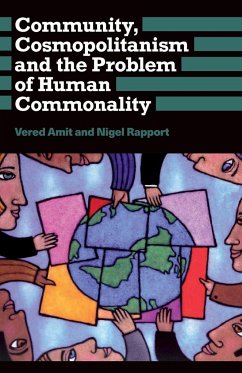
The Sociology of Cosmopolitanism
Globalization, Identity, Culture and Government
Versandkostenfrei!
Versandfertig in 6-10 Tagen
Weitere Ausgaben:

PAYBACK Punkte
19 °P sammeln!





The dream of a cosmopolitical utopia has been around for thousands of years. Yet the promise of being locally situated while globally connected and mobile has never seemed more possible than today. Through a classical sociological approach, this book analyses the political, technological and cultural systems underlying cosmopolitanism.
GAVIN KENDALL is Professor of Sociology at Queensland University of Technology, Australia. His research interests include social theory, social order and the relationship between culture and socio-technical problems. His previous books include Using Foucault's Methods (with Gary Wickham), Understanding Culture (with Gary Wickham) and State Democracy and Globalization (with Roger King). IAN WOODWARD is Senior Lecturer in Cultural Sociology at Griffith University, Australia and a Faculty Fellow of Yale University's Centre for Cultural Sociology, USA. In addition to publishing many papers on the cultural aspects of cosmopolitanism, he has written extensively on consumption practices, subject-object relations and material culture. He is the author of Understanding Material Culture. ZLATKO SKRBIS is Professor of Sociology at the University of Queensland, Australia. His research interests are located in the intersecting area of migration, nationalism, and globalization. He is the author of Long-Distance Nationalism and Constructing Singapore (with Michael Barr), and his recent articles include papers in the Sociological Review, Theory, Culture& Society and Ethnic and Racial Studies. He is a lead investigator on a longitudinal study of Australian young people and their life trajectories.
Produktdetails
- Verlag: Palgrave Macmillan / Springer Palgrave Macmillan
- Artikelnr. des Verlages: 978-0-230-00868-7
- 2009 edition
- Seitenzahl: 177
- Erscheinungstermin: 28. April 2009
- Englisch
- Abmessung: 221mm x 144mm x 18mm
- Gewicht: 366g
- ISBN-13: 9780230008687
- ISBN-10: 0230008682
- Artikelnr.: 26204230
Herstellerkennzeichnung
Libri GmbH
Europaallee 1
36244 Bad Hersfeld
gpsr@libri.de
'an excellet guide-map for researching political, cultural and ethical conditions surrounding cosmopolitanism in our era' - International Sociology
'The authors offer a clear introduction to recent debates about cosmopolitanism, providing original ideas which show that cosmopolitanism needs sociology. Cosmopolitanism is a matter of ethical stance and political order, but it cannot be understood without attention to embodied affect, patterns of social relations, culturally informed social action. Cosmopolitanism is not just a set of utopian ideals, but a phenomenon in the contemporary world which needs analysis.'
- Craig Calhoun, President, Social Science Research Council and Professor of the Social Sciences, New York
'The authors offer a clear introduction to recent debates about cosmopolitanism, providing original ideas which show that cosmopolitanism needs sociology. Cosmopolitanism is a matter of ethical stance and political order, but it cannot be understood without attention to embodied affect, patterns of social relations, culturally informed social action. Cosmopolitanism is not just a set of utopian ideals, but a phenomenon in the contemporary world which needs analysis.'
- Craig Calhoun, President, Social Science Research Council and Professor of the Social Sciences, New York
Mehr anzeigen
University, USA
'This book provides a carefully detailed dissection of cosmopolitanism, as theory and as sets of practices. The authors have produced an extremely useful resource for future analyses of the placing of cosmopolitanism in the emerging world dis/order.'
- John Urry, Distinguished Professor, Department of Sociology, Lancaster University, UK
'The authors demonstrate the sociological significance of cosmopolitanism in an imaginative and methodologically sophisticated way. They have made an invaluable contribution to the growing literature on cosmopolitanism.'
- Gerard Delanty, Professor of Sociology and Social& Political Thought, University of Sussex, UK
'[This] book is highly illuminating and instructive as to what can and should be understood under cosmopolitanism, and how the phenomena of cosmopolitanism can be studied. Scholars of globalization will find in this a highly useful orientation guide to the various sociological theories of cosmopolitanism, and in particular a fresh and empirically based synthesis that directs to possible research on the subject.'
- Professor Motti Regev, Department of Sociology, Political Science and Communication, The Open University of Israel
'This book provides a carefully detailed dissection of cosmopolitanism, as theory and as sets of practices. The authors have produced an extremely useful resource for future analyses of the placing of cosmopolitanism in the emerging world dis/order.'
- John Urry, Distinguished Professor, Department of Sociology, Lancaster University, UK
'The authors demonstrate the sociological significance of cosmopolitanism in an imaginative and methodologically sophisticated way. They have made an invaluable contribution to the growing literature on cosmopolitanism.'
- Gerard Delanty, Professor of Sociology and Social& Political Thought, University of Sussex, UK
'[This] book is highly illuminating and instructive as to what can and should be understood under cosmopolitanism, and how the phenomena of cosmopolitanism can be studied. Scholars of globalization will find in this a highly useful orientation guide to the various sociological theories of cosmopolitanism, and in particular a fresh and empirically based synthesis that directs to possible research on the subject.'
- Professor Motti Regev, Department of Sociology, Political Science and Communication, The Open University of Israel
Schließen
Für dieses Produkt wurde noch keine Bewertung abgegeben. Wir würden uns sehr freuen, wenn du die erste Bewertung schreibst!
Eine Bewertung schreiben
Eine Bewertung schreiben
Andere Kunden interessierten sich für













